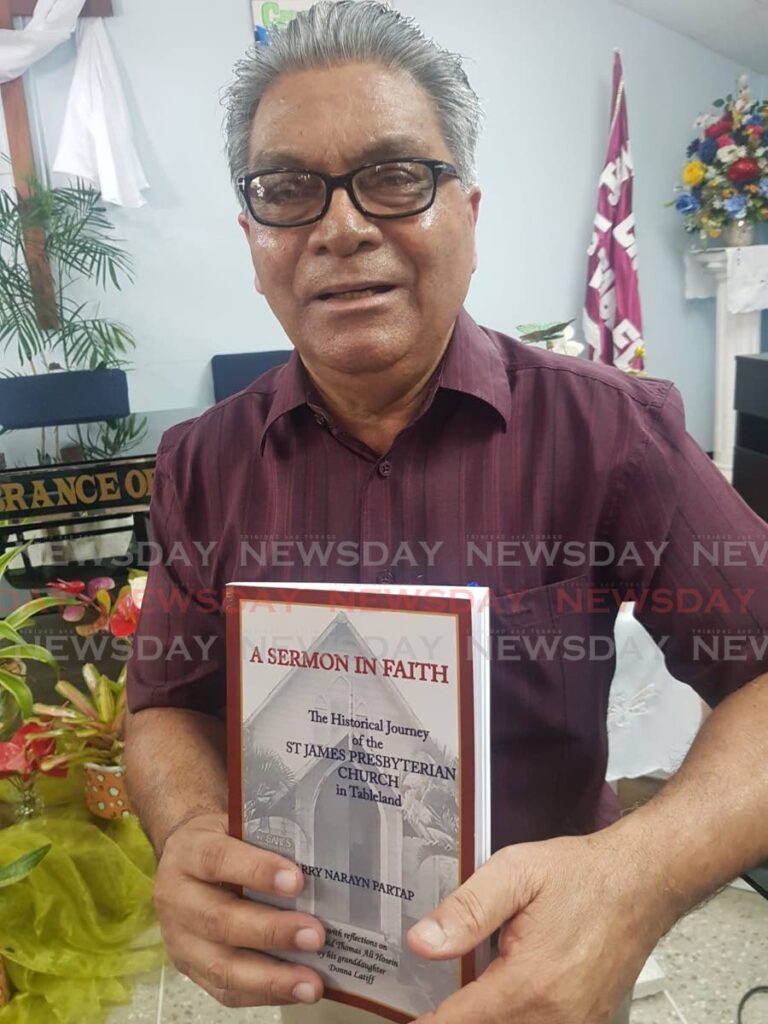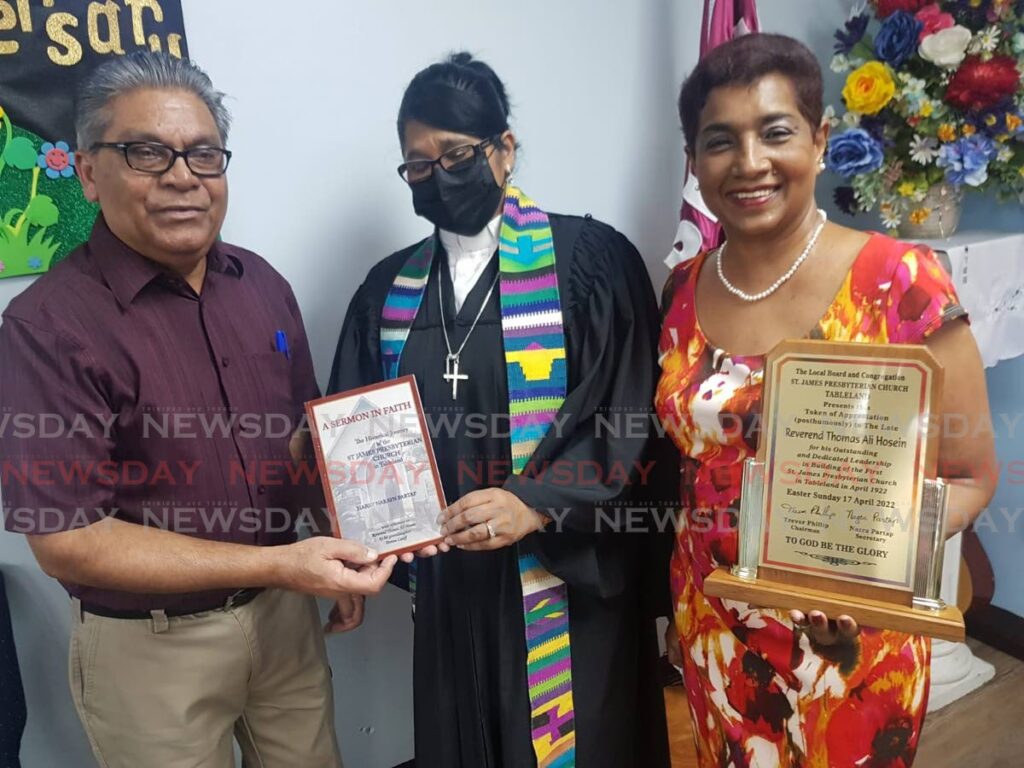Harry Partap delivers sermon on Presbyterian church journey

FORMER teacher, journalist, politician and diplomat Harry Narayan Partap has added "author" to his career.
Since he retired as high commissioner to South Africa in 2015, Partap has written his second book, A Sermon in Faith – The historical journey of St James Presbyterian Church in Tableland. The book's publication coincided with the church’s 100th anniversary on April 17.
In 2021 he published Kamla: A Defining Moment, with the subtitle: 44 Days to Transcend 44 Years. This book tells the story of the 44 days before Kamla Persad-Bissessar attained the leadership of the United National Congress (UNC), wresting power from her predecessor, Basdeo Panday and later becoming prime minister.
Partap, who will turn 81 in September, has already embarked on a third project, which he is keeping close to his chest.
“I have a number of ideas, but I don’t know that I have the time, meaning I don’t know how long God will have me here.”
The genesis of this second book is interviews Partap, a schoolteacher at the time, did as a stringer for the Express newspaper some 50 years ago. The sole intention of his interviews with Sohan Dass, JN Ramsahai and Ralph Hosier, then members of the congregation, was writing a few articles for the paper. He said he was fascinated by their recollections of the daunting task their parents faced, without modern tools, in constructing the first worship centre.

He said his journalistic imagination had him envisaging young and old trekking through forests, armed with axes, cutlasses and long two-handle saws, to gather timber for the building.
Those articles never saw the light of day, but Partap, who is something of an archivist, kept the notes in pristine condition.
A lay minister and church elder, Partap recalled in an interview with the Newsday that for every anniversary, guests would be invited and either he or another member, David Paul Chadee, would give snapshots of the church’s history, which were short on details, along with some dubious dates.
With the 100th anniversary of the dedication of the second church building approaching, Partap felt this significant period in St James’ history warranted more than just a gloss. He embarked on extensive research in an attempt to present a full picture of the establishment of the Presbyterian community in Tableland.
To his dismay, he found there was a dearth of information in the archives of the Presbyterian Church, San Fernando.
“They had no information on our small church. I found two references, which left me with the impression that remote mission stations like Tableland ended up mere footnotes in the scheme of things.”
What he laid his hands on were minutes of meetings over the years, from which he was able to gather information and verify important dates. These minutes, together with the personal testimonies of the three "old-stagers," which Partap described as "sermons of faith," helped form the basis of the book.
His quest for knowledge also led him to interview villagers who had migrated to different parts of Trinidad and interview relatives of Rev Thomas Ali Hosein, who laid the foundation for the church in Tableland.
Hosein’s relatives, including Presbyterian Moderator the Rev Joy Abdul-Mohan, along with his grandchildren, who now live in Canada, made the journey to Tableland on April 17 for the anniversary celebration.
One of his grandsons, Dr Wayne Haqq, received a token of gratitude on behalf of the late Rev Hosein, while his granddaughter Donna Lattif planted a grafted pommerac tree at the back of the church in his memory.

Pointing out that historical data, pre-1950, on the formation and administration of the Elswick and Nipal Presbyterian schools in Tableland was burnt as trash during rebuilding, Partap has preserved the minutes, which he has put in the archives as a point of reference for future generations.
Lamenting that people tend to treat records as burdens to be discarded rather than preserved, he advised, “Our local church officials should be encouraged to deposit all church records in the archives rather than in bonfires.”
In his preface, Partap writes that A Sermon in Faith is an attempt to correct this anomaly.
“It will help us in Tableland to better appreciate the legacy left to us by visionary pioneers who were simple people, inspired by Canadian missionaries.”
The book consists of 13 chapters, plus a foreword written by Dr Jerome Teelucksingh of the History Department of UWI, St Augustine.
Teelucksingh commended the author for capturing the accomplishments and evolution of this dynamic mission in Tableland and the noteworthy contributions of sincere souls whose names are not recorded.
Abdul-Mohan, delighted to write a special introduction, said the well-researched publication is a necessary contribution to the ongoing documentation of the rich and noble history, not only of St James, but the wider Presbyterian Church of Trinidad and Tobago (PCTT).
The book gives a background to the Presbyterian presence in the colony and re-establishes some of the historical facts surrounding the work and mission of the Rev Dr John Morton.
It delves into the language barriers the Canadian missionaries would have encountered in communicating with East Indian indentured workers as they sought to convert them to Christianity.
The establishment of the Elswick and Nipal Canadian Mission Indian Schools and the challenges during the social, political and economic turbulence from the 1930s-950s to keep the Presbyterian community together are also told in the 140 pages.
Partap has also contributed to the controversial debate about Hindus not having access to educational opportunities before the formation of the Maha Sabha in 1954.
“The Presbyterian presence in Tableland provides credible evidence to dismiss a narrative,” he said.
“Chapter 13 reinforces that Presbyterian schools were open to all children, regardless of race, religious persuasion or colour.
“Reference is made to the Tableland region, where children from a Hindu home not only received an education from Presbyterian schools, but were employed as teachers there.”
He quoted several prominent Hindus who praised the Presbyterian Church for it, “open-to-all” policy at its educational facilities.

Comments
"Harry Partap delivers sermon on Presbyterian church journey"